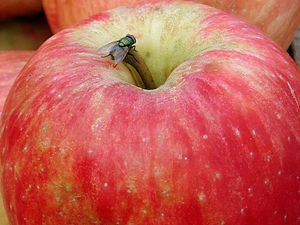 Is pesticide exposure harming your family? Experts (including doctors) have long told Americans not to worry about being harmed by the chemical cocktails of pesticides, herbicides, and insecticides used to grow our produce bigger, faster, and blemish-free. However, research has now shown that Americans, including newborns, have surprising levels of pesticides accumulating in their bodies. Now that research has linked these chemical to health problems, scientists and medical organizations are finally starting to sound the alarm. American Academy of Pediatrics Recommends Reducing Pesticide Exposure The American Academy of Pediatrics released a new policy statement describing the harmful effects of pesticides and how to reduce exposure. Here are highlights of the AAP statement on pesticides: "Children encounter pesticides daily in air, food, dust, and soil and on surfaces through home and public lawn or garden application, household insecticide use, application to pets, and agricultural product residues." "For many children, diet may be the most influential source, as illustrated by an intervention study that placed children on an organic diet (produced without pesticide) and observed drastic and immediate decrease in urinary excretion of pesticide metabolites." "There is no current reliable way to determine the incidence of pesticide exposure and illness in US children." "Improved physician education...and better diagnostic testing methods to readily identify suspected pesticide illness would significantly improve reporting and surveillance." "Many pesticide chemicals are classified by the US EPA as carcinogens." "Chronic toxicity [of pesticides has been related to] adverse birth outcomes including preterm birth, low birth weight, and congenital anomalies, pediatric cancers, neurobehavioral and cognitive deficits, and asthma...Multiple case-control studies and evidence reviews support a role for insecticides in risk of brain tumors and acute lymphocytic leukemia." "...Studies in the United States link early-life exposure to organophosphate insecticides with reductions in IQ and abnormal behaviors associated with attention-deficit/hyperactivity disorder and autism." While the AAP naturally focuses on the health of children, adults should be cautious with pesticide exposure as well. Children unfortunately serve as a "canary in the coal mine." What is harmful to them will eventually be harmful to adults as well. Pesticide Exposure Linked to Worse Brain Function & Attention-Deficit/Hyperactivity Disorder Scientists evaluating data from 14 studies and over 1600 participants have found that low-level exposure to pesticides produces lasting reductions in brain function, especially memory and information processing speed. "Derived from World War II nerve gas agents, organophosphate pesticides (OPs) are the most widely used insecticides in the world." "Concern about the effects of OPs on human health has been growing as they are increasingly used throughout the world for a variety of agricultural, industrial and domestic purposes. The neurotoxic effects of acute poisoning are well established but the possibility that low-level exposure causes ill health is controversial. The majority of well designed studies found a significant association between low-level exposure to OPs and impaired neurobehavioral function...such as psychomotor speed, executive function, visuospatial ability, working and visual memory. This follows a 2010 study published in the Journal of Pediatrics that linked OP pesticides to attention-deficit/hyperactivity disorder in children ages 8-15. Children with higher concentrations of pesticides in their urine were more likely to be diagnosed with ADHD.  Apples are one of the most chemical-contaminated fruits. Pesticides Cause Obesity? A recent study exposed human and mouse cells to a fungicide "widely used on food and ornamental crops." The scientist found that exposure to the common chemical increased expression of genes linked to obesity and encouraged the formation of more fat cells. Lower Your Risk While pesticides are clearly not the cause of all of our health problems, we should be concerned about our (especially our children's) exposure to them. There are simple ways to reduce your exposure without significantly increasing your food budget:
0 Comments
Your comment will be posted after it is approved.
Leave a Reply. |
Details
THE NATURALS
AuthorsDr Aaron McMichael + Dr Ryan McMichael Categories
All
Archives
October 2024
_Information and statements made are for education purposes and are not intended to replace the advice of your treating doctor. This blog is not a doctor and will not diagnose or treat your problems.
|
 RSS Feed
RSS Feed